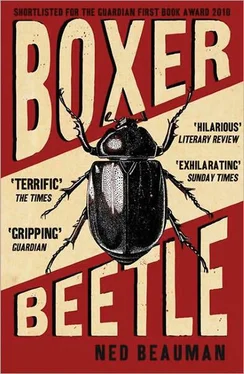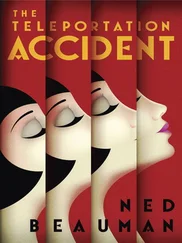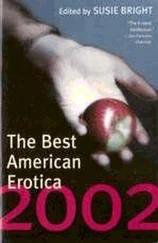‘Hey, we should stop for him.’
The Welshman didn’t even answer. He hadn’t spoken for hours. I thought about Winchester College. Grublock had once told me it was the happiest time of his life, even though he wasn’t so rich then. ‘People assume that one is taught at public school to be callous towards the common man, Fishy, but that’s not true,’ he had once said to me. ‘I am only callous towards the common man because the common man is so callous towards me.’ In fact, as we both knew, it was for heartfelt Nietzschean reasons, but he happened to be in a self-justifying mood. ‘These days, if you blamed the world’s problems on a “conspiracy of international financiers”, you’d naturally be put down as an atavistic crackpot and most likely a Jew-hater, but it’s perfectly acceptable for good liberals to talk about “rich property developers” as if we were all united in evil. All those people who say they don’t like property developers, I suppose they live in houses they built with their bare hands on unclaimed soil. I suppose they would rather live somewhere like where you live, Fishy. A place which is to architecture as a parking ticket is to literature.’ I had wanted to defend my home, especially as Grublock had never actually seen it with his own eyes, but it wasn’t easy. Whatever I may have said about Batman, I like a lot of sixties’ buildings. Just not the one I live in. Perhaps I would like it better if it didn’t feel so much like no one was ever really supposed to live in it.
Later, as we drove on, I said to the Welshman, ‘You don’t work for anyone, do you? You don’t work for Grublock. You don’t work for the Japanese. You don’t work for the Ariosophists. You’re just a collector, like me, and you’re on your own. I should have guessed. What’s your best piece? I collect the Goebbels Gottafchen Goethe — well, I did, until what happened to Grublock. Have you heard of it?’
The Welshman still didn’t answer. But when we passed a big blue sign that predicted a knife and fork two miles down the road, he said, ‘Are you hungry?’
‘Yes, but I don’t want to go to Little Chef.’
‘I eat there quite often.’
We pulled over into the car park and the Welshman unlocked my handcuffs.
‘I don’t have to worry about you making a fuss,’ he said.
‘No.’
‘Because if you do, then you will be my brother-in-law with paranoid schizophrenia and we will be stopping for breakfast on the way to a clinic in Southampton. I will apologise to the waitress and take you out of the restaurant, everyone will forget about it, and then I will shoot you and bury your body in the New Forest. I’ve done it before. It’s very easy.’
‘Right.’ The Welshman always sounded so reasonable — it was something about the accent.
We went into the purgatorial café and sat down. I ordered smoked haddock on toast, as I sometimes do in the hope that passers-by might mistake my smell for a preternaturally pungent lump of fish. The Welshman ordered a full English breakfast, which I wouldn’t eat because of all the phosphatidylcholine in the baked beans. At the next table was a mother with three small children, bawling and brawling. I noticed that her mobile phone was lying unattended at the edge of the table.
‘Are you going to tell me where we’re going?’ I said.
‘A place called Claramore. There’s evidence that Seth Roach attended a political conference there in the summer of 1936.’
‘What is it? A country house?’
‘Yes. Until soon after the Second World War the property belonged to William Erskine, the Ninth Earl of Claramore. Then the title, house and land were sold to an American film producer. In the eighties it became a private hospital for women with eating disorders. And now it’s a hotel.’
That was when I did exactly what Batman would have done. You see, just as our food arrived, one of the children knocked a cup of blackcurrant squash off the table, spraying the Welshman’s trouser leg. There was a moment of confusion as the waitress and the Welshman and the boy’s mother all fumbled with napkins, and that was when I reached across to grab the mobile phone. Praying that nobody had seen, I hid it between my legs.
If the Welshman went to the toilet or something I could call 999, but of course he wouldn’t leave me alone in a public place for even half a minute. Could one send a text message to the police? I had no idea. I decided to text Stuart. Luckily, I know his number off by heart from the rare occasions that we speak, and with the help of the little finger-orienting bumps on the ‘5’ button I was able to type and send the message almost without looking down at the screen. ‘stuart its kevin being held hostage irl by man w gun taking me to place called claramore need help not a joke dont try to call thanks.’ Normally I find correct punctuation very important, but there was no time.
I knew Stuart would believe me — he has spent his whole life waiting for something like that to happen to him — and about fifteen seconds later the phone vibrated with a reply: ‘omfg ok will call police.’ My heart pounding, I dropped the phone between the tables. It clattered on to the sticky tiles. The mother picked it up without even looking at me and began to remonstrate with her children again.
An hour later, at about eleven o’clock, we were turning north off the A303. The Welshman made me map-read as we wound through the woods. Since a trip to Epping when I was fourteen years old, the only dense woods I had experienced were the ancient forests through which I hunted trolls and goblins as a battle mage, and the sheer quantity of leaves and shadows here seemed to speak of unimaginable reserves of computing power.
‘What are we going to do when we get there?’ I said.
‘I don’t know exactly. We will look for clues. And I hope that with your expertise in finding things that have been lost for a long time — your expertise in which Mr Grublock put such trust — we should have a good chance of finding out what really happened here in 1936.’
‘What do you mean, “what really happened”?’
‘Claramore was the site of a well-publicised murder,’ he said as the house itself came into view about a quarter of a mile down the road, a squat hulk of red brick and marble. There was something presciently functionalist about its blocky front elevation, and I felt as if we were approaching the giant processing core that simulated the forest around us, or the generator that powered the birds and the insects and the swaying wild grass. ‘The police believed they had solved the case, but their suspects had already disappeared and were never seen again. There are two points to note. The first is that everyone who knew anything about the case seemed to be convinced that the police had got it wrong. The second is that, apart from those two suspects, and apart, obviously, from the corpse, there was another fellow who was never seen again after the incident at Claramore. Seth Roach. I think he was the real murderer. And I think he died here, too.’
In the last years of his life, Erasmus Erskine began to treat Claramore as if it were little more than a rusty barge conveying him towards the coral harbour of Kumari Kandam. Busy sponsoring a series of expeditions to the Coromandel coast, he made no serious repairs or improvements to his decaying ancestral home, nor did he take any notice of his wife’s increasingly pressing suggestions. But when he died in 1912 Claramore passed to his son William, who thought servants should have better things to do than shore up a ruin. Fascinated by a three-ton hand-cranked tide-predicting machine he had seen at Admiralty Arch in London, he decided to modernise the place so thoroughly that it would still be modern in a hundred years.
Читать дальше











